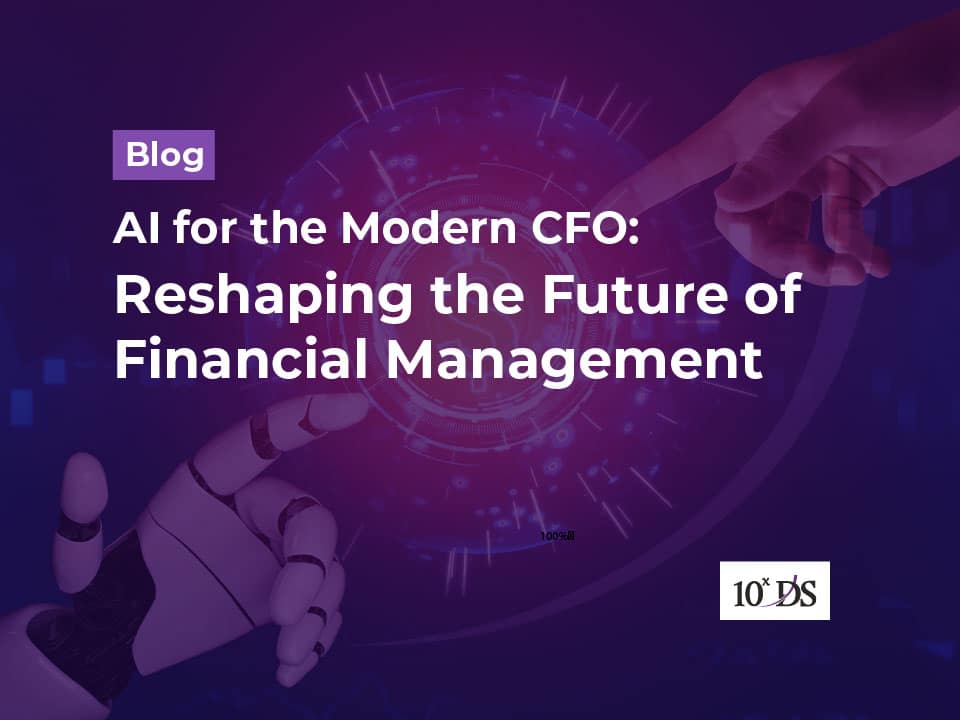
AI for the Modern CFO: Reshaping the Future of Financial Management
The emergence of artificial intelligence (AI) has transformed the way companies operate and make decisions. For Chief Financial Officers (CFOs), it is crucial to understand how AI can help you unlock new opportunities, increase efficiency, and achieve better financial outcomes. CFOs are responsible for overseeing the financial operations of a company, including financial reporting, budgeting, forecasting, and risk management. They also make strategic decisions that impact the financial health of the organization. The CFO is also required to provide guidance and leadership in financial matters and ensure that the company is operating in a financially sustainable manner. It requires considerable insights and data to enable the CFO to play such a crucial role in an organization. With the vast amount of data that companies generate, it’s becoming increasingly challenging to analyse and interpret financial information in a timely and accurate manner. This is where AI comes in, providing valuable insights that can help CFOs make better-informed decisions. In this blog, we will explore the different ways AI can be used by CFOs to improve financial performance, manage risk, and enhance decision-making capabilities. We will also address some of the common concerns and misconceptions surrounding AI and discuss how CFOs can effectively implement and leverage AI in their organizations. Join us on this journey to realise the value of AI as the CFO of a digital business.
A few trends and perspectives on the role and adoption of AI in finance that will aid CFOs in the long run are listed below:
- Improved accuracy and efficiency: Many CFOs see AI as improving the accuracy and efficiency of financial processes. AI tools can analyse large amounts of financial data in a short amount of time, identify patterns and trends, and provide insights that would be difficult or impossible to find using traditional methods. This can help CFOs make more informed decisions and improve financial performance.
- Streamlined reporting and compliance: AI can also help CFOs streamline reporting and compliance processes, which can be time-consuming and resource-intensive. AI tools can automate data collection, analysis, and reporting and ensure that financial reports are accurate and compliant with regulatory requirements.
- Enhanced risk management: CFOs are also seeing the potential of AI for enhancing risk management. AI tools can help identify potential risks and vulnerabilities and provide real-time alerts and recommendations for mitigating those risks. This can help CFOs proactively manage risks and avoid financial losses.
- Integration with other systems and technologies: As AI evolves, it is becoming more integrated with other systems and technologies, such as cloud computing, blockchain, and the Internet of Things (IoT). This integration can help CFOs gain a more complete and accurate view of financial data and make better-informed decisions.
How to get started with AI for financial management
1. Understanding the potential benefits of AI
As a CFO, it’s important to have a clear understanding of the potential benefits that AI can bring to a digital business. This might include increased efficiency, cost savings, improved accuracy and speed in decision-making, and better customer insights.
2. Identifying areas where AI can be applied
Once you have a sense of the potential benefits of AI, it’s important to identify specific areas where it can be applied within your digital business. This might include things like automating routine tasks, analysing large datasets, improving forecasting and risk management, or personalising customer experiences.
3. Assessing the costs and risks of implementing AI
While AI can bring significant benefits, it’s also important to carefully consider the costs and risks associated with implementing these technologies. This might include things like data privacy concerns, the cost of acquiring and maintaining AI systems, and the potential for job displacement or other negative impacts.
4. Developing a strategy for AI implementation
To realise the value of AI as a CFO, it’s important to develop a clear strategy for implementing these technologies within your digital business. This could mean working with other leaders in the organisation to identify key areas to focus on, evaluating potential AI vendors or partners, and making a plan for training employees and integrating AI into existing workflows.
5. Measuring the impact of AI on business performance
Once AI systems are in place, it’s important to measure their impact on business performance and adjust strategies as needed. This could mean keeping track of key performance indicators, reviewing AI systems regularly, and using data to make decisions about where to invest in AI technology in the future.
Conclusion
Tech giants have poured billions on artificial intelligence, and OpenAI’s ChatGPT has made AI so mainstream that it’s already causing disruption in a wide range of fields. The wisest course of action for any business and any CFO is to take advantage of AI’s ability to handle routine tasks and free up employees to focus on creative problem solving.
Talk to our experts to learn more.


